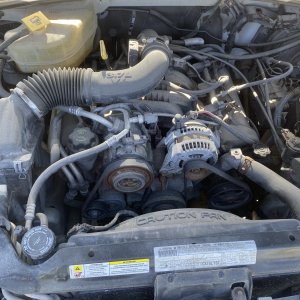MoladoGuy said:
While your vehicle is running you have a hot exhaust system running below the car, an engine compartment that is currently generating electricity along with spark plugs (aka "electricity"). With that in mind you do realize that gasoline does not begin to "catch fire" rather its the vapors that ignite. Also, you do realize that gas is heavier than air and will inevitably escape towards the ground (below the Jeep). Below the Jeep? What did I mention was going on under there? Oh yea, spark plugs and sensors along with an engine system that generates lots of electrical current. These along with gas vapors can be a wonderful combination to start a fire.
Now you also have to realize that the vehicle is in a positive charged state while turned on. So when you exit your car in dry or cold weather, you could seriously cause some sort of spark because you were part of the positivley charged vehicle (your have a positive charge). Any friction with external material in the dry or cold weather can be a great combination for static electricity. Again, something easy that can generate enough spark to ignite fumes. However, I have to believe that we ground ourselves the minute we touch the gas nozzle. On the other hand the car is still running (positive state) so we now could easily fall prey to static discharge while pumping.
With todays gas stations they use vapor recovery systems that generally remove the possibility of vapor escaping while pumping. But, we all do spill gas or slowly remove the gas nozzle from our tanks (opening the gas tank to release fumes).
Even with what I said though the chances of this happening are extremeley small. But, it could happen!! I don't want to be that statistic of .00000002343% occurance.
The only way to prevent any of those risks is for people to turn off the vehicle in the street and push it in to fill up and push it out of the lot to start back up.
Because for every car there is turned off and filling up there is one running and pulling in or going out.
You pose equal risk just pulling into the lot. Also, spark plugs are sealed off completely and your exhaust system is hot as F for like 5-10 minutes even after your vehicle is off; though hotter while running the risk remains regardless.
The static issue has nothing to do with a running vehicle and everything to do with general stupidity. (Remember that even though the vehicle may not be on it is still actively powering numerous portions of the vehicle, and retains the same charge while on or off. Though static charge may be built up more easily while its running due to other reasons, it is still common knowledge to discharge yourself before pumping gas.)
Also, generating electricity does not pose any risks in itself, though sparks may be a different matter. I don't believe there has EVER been a case of an alternator starting a gas station fire. Or any gasoline related fire for that matter. Even more, in order to ignite gas fumes with a spark you need an exact concentration of vapor/air, not to mention an exact concetration leading back to the fluid source. This is nearly impossible and the odds are even lower because of the engine fan circulating so much air through the engine compartment.
But the most important rebuttle I can make is that if a running vehicle was not safe on the grounds, you just wouldn't be allowed to drive in, let alone wait in line with the vehicle running.
I agree that any of those things you have said are potential risks, but none of which have anything to do with your vehicle running, hell if someone pulled up on the other side of your pump, their engine would be closer to you than yours, and I don't expect you would go running away at that.










